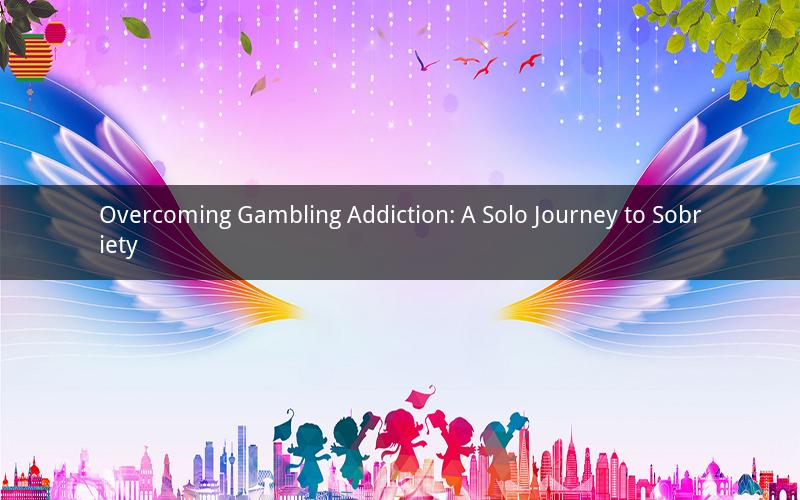
1. Introduction
Gambling addiction, also known as compulsive gambling, is a serious problem that affects millions of people worldwide. It can lead to financial, emotional, and social consequences. For those who want to overcome this addiction, the question arises: how to stop gambling addiction on my own? This article explores various strategies and resources that can help you embark on a solo journey to sobriety.
2. Understanding Gambling Addiction
Before delving into the methods to overcome gambling addiction, it's essential to understand what it is and how it affects your life. Gambling addiction is characterized by an inability to control or stop gambling, even when it causes significant problems. The addiction can be categorized into two types: problem gambling and pathological gambling.
3. Identifying the Signs of Gambling Addiction
Recognizing the signs of gambling addiction is the first step in overcoming it. These signs include:
a) Continual financial difficulties due to gambling debts
b) Preoccupation with gambling, even when it affects your work or personal life
c) Lying to loved ones about gambling activities
d) Chasing losses, attempting to win back money lost
e) Using gambling as a means to escape problems or negative emotions
f) Risking more money or time than intended
g) Ignoring responsibilities due to gambling
4. Strategies to Stop Gambling Addiction on Your Own
Now that you understand what gambling addiction is and its signs, let's explore some strategies to help you overcome this addiction independently.
a) Acknowledge the Problem
The first step in overcoming gambling addiction is to admit that you have a problem. This can be challenging, but it's essential for progress. By accepting that you need to change, you are taking the first step towards recovery.
b) Set Realistic Goals
Set achievable goals to help you stay on track. These goals can be short-term (e.g., avoid gambling for one week) or long-term (e.g., stop gambling entirely). Remember to celebrate your successes along the way.
c) Create a Support System
Even though you're taking this journey alone, it's essential to have a support system in place. Share your struggles with trusted friends or family members who can offer encouragement and hold you accountable.
d) Avoid Triggers
Identify and avoid situations that trigger your urge to gamble. This may include certain places, social settings, or even certain times of day. Replace these triggers with healthier habits, such as exercise or hobbies.
e) Seek Professional Help
If you find it challenging to overcome your gambling addiction on your own, consider seeking professional help. A therapist, counselor, or psychologist can provide guidance, support, and coping strategies tailored to your needs.
f) Develop Coping Skills
Learn to cope with negative emotions and stress without resorting to gambling. This can include mindfulness, meditation, or other relaxation techniques. Developing these skills can help you avoid the urge to gamble.
g) Educate Yourself
Understanding the consequences of gambling addiction can help you stay motivated to overcome it. Educate yourself on the risks and dangers associated with gambling, and use this knowledge to reinforce your commitment to recovery.
5. Resources for Overcoming Gambling Addiction
In addition to the strategies mentioned above, there are several resources available to help you on your journey to overcoming gambling addiction.
a) Gamblers Anonymous
Gamblers Anonymous is a worldwide organization that offers support for individuals struggling with gambling addiction. They offer meetings, literature, and a 12-step program to help you recover.
b) Online Support Groups
There are numerous online support groups and forums dedicated to helping those with gambling addiction. These communities provide a safe space to share your experiences, seek advice, and connect with others who understand what you're going through.
c) Books and Articles
Reading books and articles about gambling addiction can provide valuable insights and coping strategies. Some popular titles include "Bet the Farm" by James McManus and "Split Second: A Memoir of Addiction" by Ellen Willis.
6. Conclusion
Overcoming gambling addiction on your own is a challenging yet rewarding journey. By understanding the problem, identifying signs, and implementing strategies to cope with triggers and emotions, you can take control of your life and move towards sobriety. Remember to seek support when needed and utilize available resources to help you along the way.
Questions and Answers:
1. Q: How can I recognize if I have a gambling addiction?
A: Signs of gambling addiction include financial difficulties, preoccupation with gambling, lying about gambling activities, chasing losses, using gambling as an escape, and neglecting responsibilities.
2. Q: Can I overcome gambling addiction without seeking professional help?
A: Yes, it is possible to overcome gambling addiction on your own. However, seeking professional help can provide additional support, coping strategies, and guidance tailored to your specific needs.
3. Q: What are some healthy habits to replace gambling?
A: Healthy habits that can replace gambling include exercise, meditation, hobbies, and engaging in social activities. These habits can help you manage negative emotions and stress without resorting to gambling.
4. Q: How long does it take to overcome gambling addiction?
A: The duration of recovery from gambling addiction varies for each individual. Some may experience immediate relief, while others may need ongoing support and therapy for several months or years.
5. Q: Can my friends and family help me overcome gambling addiction?
A: Yes, friends and family can play a significant role in supporting your recovery. They can offer encouragement, hold you accountable, and provide a safe space for you to share your struggles.